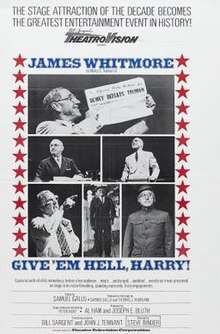Give 'em Hell, Harry!
Give 'em Hell, Harry! is a biographical play and 1975 film, written by playwright Samuel Gallu. Both the play and film are a one-man show about former President of the United States Harry S. Truman. Give 'em Hell, Harry! stars James Whitmore, and was directed by Steve Binder and Peter H. Hunt.
| Give 'em Hell, Harry! | |
|---|---|
 Theatrical release poster | |
| Directed by | Steve Binder Peter H. Hunt (stage production) |
| Produced by | Bill Sargent Joseph E. Bluth |
| Written by | Samuel Gallu |
| Starring | James Whitmore |
| Music by | Pearl Kaufman |
| Cinematography | Ken Palius |
| Edited by | Steve Binder |
Production company | Permut Presentations Theatrovision |
| Distributed by | Theater Television Network |
Release date | September 18, 1975 |
Running time | 104 minutes |
| Country | United States |
| Language | English |
| Budget | $230,000 |
| Box office | $11,000,000[1] |
Title origin
The title comes from an incident that took place during the 1948 Presidential election campaign. In Bremerton, Washington, Truman delivered a speech attacking the Republicans. During the speech, a supporter yelled out, "Give 'em Hell, Harry!" Truman replied, "I don't give them Hell. I just tell the truth about them, and they think it's Hell." Subsequently, "Give 'em Hell, Harry!" became a lifetime slogan for Truman supporters.
History
The play previewed in Hershey, Pennsylvania, followed by its official opening at Ford's Theatre in Washington, D. C. Its April 17, 1975, premiere was hosted by Truman's daughter Margaret, and attended by President Gerald Ford. The play then went on to a six-city tour, during which it was videotaped for film on the stage of the Moore Theatre in Seattle, using a live editing process called Theatrovision.[2] Although the play has been regularly revived, it did not make its New York debut until July 2008 at St. Luke's Theatre.
Awards
James Whitmore was nominated for Best Actor by both the Academy Awards and the Golden Globes. It is only the third film to have its entire credited cast (Whitmore) nominated for an Academy Award, the first two being Who's Afraid of Virginia Woolf? in 1966, for which almost all members excluding the extras were nominated, and Sleuth in 1972.[3] Whitmore was also nominated for, and won, a Grammy Award for Best Spoken Word Recording.
References
- Box Office Information for Give 'Em Hell, Harry! Box Office Mojo. Retrieved June 13, 2018.
- Ebert, Roger (January 1, 1975). "Review: Give 'em Hell, Harry!". Chicago Sun-Times.
- "Follow these clues to the original 'Sleuth'". USA Today. October 11, 2007. p. 2D.